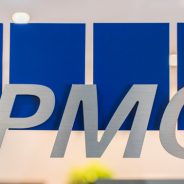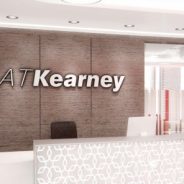Search results for career:
Top MBA Recruiters: Finding Your MBA Career at PwC Firm Strategy&
Navigating job applications and interviews after all the hard work of earning your MBA can be tiresome. After devoting a year or more of your time to gaining the skills of a top business professional, shouldn’t future companies be knocking down your door?
It might not be that easy, but there are certainly a number of companies currently seeking the best and the brightest up-and-coming business leaders, who acknowledge the kind of skills an MBA can contribute to their team. Among them is Strategy&, one of the top recruiters of MBA students at business schools throughout the world.
For MBA graduates looking for careers in the consulting industry, Strategy& could be the perfect opportunity to break into the field and develop critical skills in strategy and consulting. And as an MBA graduate with a wealth of knowledge within the industry, companies like Strategy& are probably also looking for you.
About Strategy&
Strategy& was established more than 100 years ago by Edwin G. Booz, eventually being known for most of its life as Booz & Company. In 2014, the firm was acquired by PricewaterhouseCoopers (PwC), when it was renamed to Strategy&. The firm is headquartered in New York City, with more than 57 offices throughout the world. Today, the company features roughly 3,000 employees and more more than $1.3 billion in revenue.
Strategy& functions currently as the strategy consulting team for PwC, offering strategic solutions in an uneven business climate, helping companies to transform, invest in growth, and stay in tune with business trends even through rapidly changing times.
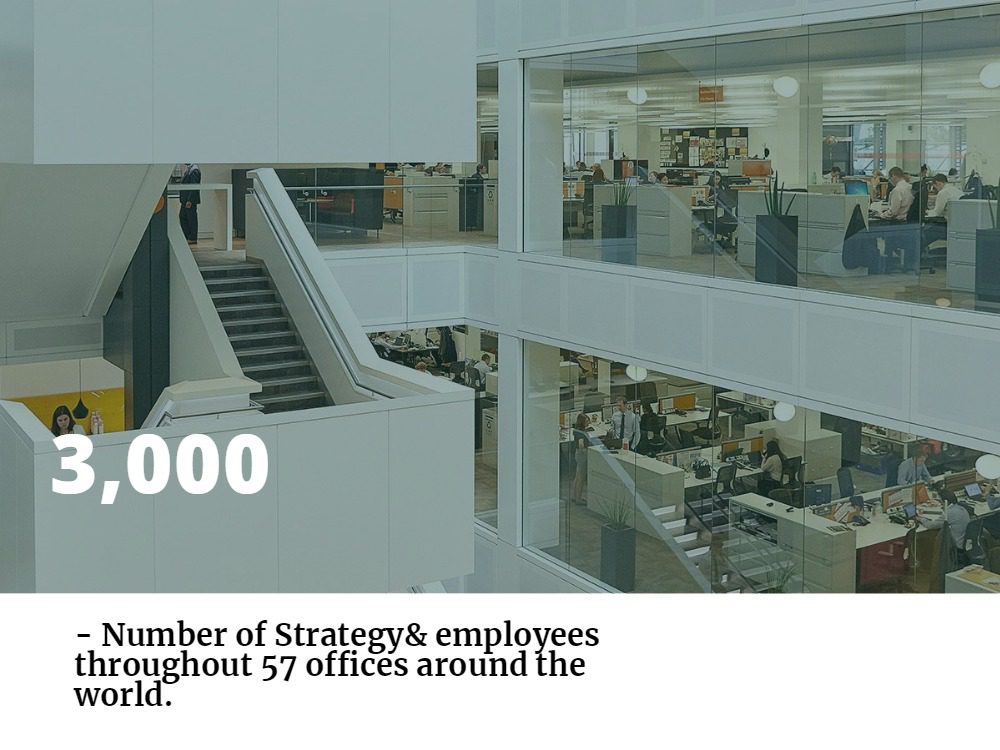
Why MBAs Love Strategy&
Strategy& is an active recruiter from business schools around the world, including top programs like Harvard Business School, NYU Stern, and INSEAD, among many others. The company is also supportive of staff who have not yet earned an MBA but hope to advance their business education. Strategy& even offers junior staff the chance to apply for full MBA sponsorship, and provides flexible work opportunities so students can pursue a degree while still maintaining their career.
The Strategy& consulting experience is shaped in a way that relies on mentorship, with a 1:6 ratio of partners to junior consultants. For MBA students—who have already demonstrated an interest in investing in their growth and education in the field—this type of setting means that class is always in session.
Life at Strategy&
New consultants at Strategy& can expect a clear and structured path laid out at the start of their career, with rapid career progression possible. New associates will advance towards roles as partners, typically spending two to three years at each level along the way.
While undergraduates would begin in associate roles, those with MBA degrees can jump right in at the senior associate level. Senior associates have the opportunity to develop their skills by working closely alongside clients to resolve complex issues and guide clients and their companies towards success. From there, MBAs could move upward into a manager role, then director, and finally partner.
The development of strong mentor relationships is seen as crucial at Strategy&. Mentors will provide a constant source of support for new associates, offering guidance as they move upwards through the company, choosing projects they are passionate about and forming strong professional networks. Mentors will also provide real-time feedback, helping pave the way for a successful career.
Landing a Job at Strategy&
Strategy& is an active recruiter of MBA programs throughout the country, where they may host events on campus and offer direct information to students on applying for positions at the company. Students from any program, even if the school does not actively recruit there, are able to apply directly for their internship and job openings through their website. Jobs are available at a number of the firm’s locations throughout the country and around the globe.
Summer internship opportunities are a great way for students to get their foot in the door at Strategy&, and may end up leading to full time employment. This was the case for Bryan, now a director at the company and based out of Chicago. Bryan interned for the company during the summer while earning his MBA at the University of Chicago Booth School of Business. He completed his MBA in 2011, joined Strategy& as a full-time colleague, and is now a key member of the Technology Strategy team.
“I had the opportunity to do an internship with the firm between my first and second year at business school, and I came away impressed with the caliber and character of the people at the firm,” Bryan said of his experience with Strategy&. “In only nine weeks, the camaraderie and professional bonds that I was able to develop with my teammates, fellow interns and leaders at the firm was special.”
Finding Your Dream MBA Career at Barclays
For over 300 years, Barclays has been one of the leading international banks for both consumer corporate investments. MBA candidates are drawn to Barclays not only for its stature in the global finance industry but also for the vast array of professional opportunities it offers. Within business banking, corporate banking, customer banking solutions, marketing, investment banking, and technology career paths, Barclays’ training, mentorship, networking, and travel opportunities are often unparalleled in the financial industry.
Barclays’ MBA Recruitment Program
At Barclays, one major key to continued growth and success consists of building strong interdisciplinary business networks. As part of Barclays’ ongoing development opportunities, the company maintains a robust campus recruiting system. Barclays makes a point to develop relationships with their future prospects as early as possible in their educational and professional careers.
For students pursuing an MBA, Barclays offers the MBA Ambition Diversity Program, a summer internship program dedicated to talented and motivated MBA candidates. Within the MBA Ambition Diversity Program, Barclays initially gives a candidate a “condensed version of our on-campus recruiting process during the summer before you start your MBA, culminating in interviews at our New York office.” Successful candidates will then be offered an internship position the following summer after the first year of business school is completed. Once a candidate has been accepted, Barclays offers a fellowship program that “provides $45,000 toward first-year tuition and academic expenses.”
Barclays prides itself in seeking out women, men, and non-binary individuals of all backgrounds to cultivate a diverse environment for employees to learn from one another. The idea is that this multifaceted workspace will help employees expand their cultural perspective as they embark on a career in global finance.
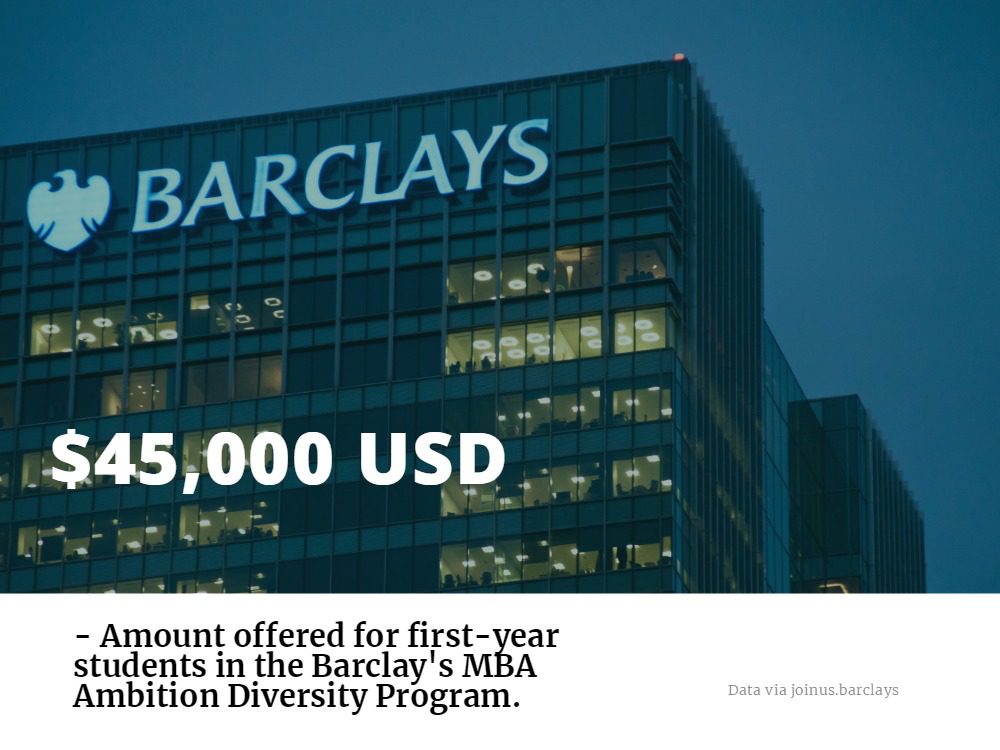
As of October 2017, Barclays has begun to offer free accommodation for graduates taking job interviews in London, Birmingham, and Manchester. This is for all graduates—not only Barclays applicants.
The Barclays Career
In 2016, Barclays’ head of banking associate recruitment, Kristi Robson, explained in an interview that MBAs are commonly hired into their banking division where Barclays has its largest intake. Banking interns and employees generally move into a product or coverage role within Equity Capital Markets or Technology, Media & Telecommunication, for example. Robson explains, “We do hire a small number of MBAs into our research business but this is dependent on business need.”
According to the 2017 WSO Investment Banking Industry Report, first-year analysts earn between $70,000 and $150,000 USD based on experience and by year three average between $120,000 and $350,000. “At the analyst level, it is not uncommon to work between 80 to 120-hour weeks at some firms. Most analysts start in the summer and receive their first investment banking analyst bonus around June or July, approximately one year after the analyst starts working. Analysts also often receive a signing bonus from $5,000 to $20,000, as well as a moving bonus if they are transferring laterally to a different bank.” For these reasons and more, Barclays strives to provide their candidates with every opportunity to grow professionally.
Education Opportunities
The following London MBA programs are reputable feeders for roles at Barclays. They are all remarkable schools for distinct reasons but each provides a formidable mix of business education and valuable alumni networks:
- Ashridge Executive Education
- Cass Business School – City University London
- Cranfield School of Management
- Henley Business School – University of Reading
- Imperial College Business School – Imperial College London
- Judge Business School – University of Cambridge
- London Business School
- Saïd Business School – University of Oxford
If you’re driven and wish to work for a large organization that still believes in “small-business”-style relationships and offers unique opportunities to develop business skill-sets and global perspectives, then Barclays could be the perfect fit.
The Next Big MBA Career: Global Supply Chain Management
It’s no secret that the world of business is global, fast-paced, and dependent on the movement of goods from one location to another.
As these given features of the business world continue to become more pronounced, those who prefer their “i’s” dotted and “t’s” crossed have started taking their rightful places in boardrooms. Supply chain managers, once considered a secondary or tertiary level of management, have risen to the executive level. In the process, they have become one of the most interesting and lucrative positions in business today.
In a U.S. News article quoting John Fowler, Professor of Supply Chain Management (SCM) in the W.P. Carey School of Business at Arizona State University, he assuredly states that “the average starting salary for our full time MBAs with a specialization in Supply Chain Management was almost $96,000, with a couple of students in the $120K range.” The question remains, though: what exactly does a supply chain manager do?
Supply Chain Management
What’s most interesting about a supply chain manager position is how it has changed over the years— as J. Paul Dittman writes in Supply Chain Management Review, “Ten years ago, the supply chain leader … was a largely functional role that relied on technical proficiency in discrete areas: knowledge of shipping routes, familiarity with warehousing equipment and distribution-center locations and footprints, and a solid grasp of freight rates and fuel costs.”
And while a supply chain manager must remain on top of such functional knowledge today, the position has become infinitely more demanding, with the supply chain manager dealing with processes, inputs, and outputs both upstream and downstream in the creation of a finished product. Thus, supply chain managers must orient themselves toward traditional logistical concerns, but also concerns about raw materials, manufacturing systems, procurements, and marketing/sales. At its heart, the supply chain management position is holistic and complex, and demands a lot from whoever fills it.
Skills Necessary to Succeed in Global Supply Chain Management
While professionals in the global supply chain management field must hone various skills depending on their companies’ needs, the following are some necessary skills for anyone wanting to get into SCM:
- Thinking Globally: Supply chains are increasingly multinational in scope, and so the global supply chain management professional must have deep knowledge of suppliers and customers that span continents.
- Work Sustainably: As sustainable processes become more profitable and more consumers become aware of corporate environmental practices, it is increasingly paramount for SCM professionals to foster and commit to sustainability both upstream and downstream, particularly in the gathering of raw materials.
- Lead Effectively: As SCM positions become more central to organizational leadership structures, the need for charismatic, savvy, friendly, and collaboratively-minded individuals in such positions grows—and the need for such individuals to be able to work cross-company and cross-industry grows, too.
- Have a Tireless Work Ethic: As the demands of the global economy never sleep, SCM professionals should expect to work anywhere between 55 and 80 hours per week, though be compensated handsomely for such non-traditional hours.
The Best Supply Chain Management MBA Programs
There are many wonderful programs in supply chain management, but the following are three of the best, according to U.S. News rankings.
- Michigan State Broad: Eli Broad’s Masters in Supply Chain Management (MSSCM) is a unique program, as it combines onsite courses and learning with online modules, allowing for a more seamless integration of SCM principles into already-existing work schedules and professional commitments.
- MIT Sloan: the Leaders for Global Operations MBA/MS track is among the most elite SCM programs offered, with a defined track for those students who wish to delve deeper into SCM. Companies in the Boston area clamor for students to work on global supply networks after graduation.
- ASU Carey: The W. P. Carey Master of Science in Global Logistics (MS-GL) degree is a nine-month program that prepares those interested in SCM for the complex world of global operations and multicultural perspectives.
Start Your Career at KPMG with an MBA
Those of you who actively watch the stars and skies might not be surprised by the parallels between the business universe and our actual cosmos.
Making Your Post-MBA Career with Visa Inc.
The race for superiority in the global electronic payments market is a heated one. Every major credit card company has pulled out all the stops to persuade consumers to embrace digital transactions as their primary payment method—and they are going to need all the help they can get. It’s one of many reasons why major companies like Visa are always recruiting MBAs.
How to Turn an MBA into a Career with Tesla
Tesla, Inc. founder and the tech entrepreneur world’s newest shining beacon Elon Musk, a graduate of the Wharton School at the University of Pennsylvania, once pessimistically said, “As much as possible, avoid hiring MBA’s. MBA programs don’t teach people how to create companies … our position is that we hire someone in spite of an MBA, not because of one.” Continue reading…
The Secret to Writing a Successful MBA Career Goals Essay in 2018
The MBA application essay is still the most feared part of most applications. Whether you have to write 1,000 words or just 500, saying everything you need to say in a concise, intelligent, and appropriate manner isn’t easy for everyone. In fact, it can be incredibly frustrating. And while every school asks different essay questions, there’s one question you’re almost guaranteed to see, “What are your short-term and long-term post-MBA career coals and how will School X help you achieve these goals?”
The career goals essay is one of the most common and also most difficult essay questions. On the surface, it seems simple, but there’s a lot of work required if you want to wow the admissions committee (adcom). It all starts with the question.
Breaking Down the MBA Career Goals Essay
Before you can write your career goals essay, you have to break it down into digestible and answerable pieces. There are six pieces to the career goals essay that you’ll need to consider before you begin writing.
1. Where are you now?
Before you can talk about your goals, you have to know where you are now and so does the adcom. This means that your essay will need to concisely describe your current position so that you can better explain your goals.
2. What are you short-term goals?
Short-term and long-term goals are not the same. Short-term goals refer to your immediate plans after graduation. Is there a particular industry where you want to work? Do you have a job or promotion in mind? Where do you see yourself in the immediate months post-MBA?
3. What are your long-term goals?
Long-term goals take a little more thought. You might not be as specific about companies or job titles when talking about your long-term goals, but that doesn’t mean you shouldn’t have a plan. Think about where you want the MBA to take you in ten or twenty years.
4. Why will an MBA help?
Next, you need to discuss how an MBA will help you achieve both your short-term and long-term goals. You’ll need to discuss technical skills, analytical skills, focus areas, and more.
5. Why is the School vital?
You need to make your essay personal. Not just any MBA should work for your goals. You need to explain specifically why School X is vital to your success. Get as specific as possible.
6. Why now?
Finally, you need to discuss why NOW is the best time to get your MBA and pursue your goals. Make a case for why this year, this class, and this moment are vital to your life.
Writing the MBA Career Goals Essay
Now that you know all the components of the essay, it’s time to start writing. To successfully answer the question, there are a few things that you need to keep in mind.
Be Specific
You need to be as specific as possible when answering each of the six parts of the question. MBA adcoms want to see that you have a specific direction in mind and that you have valid reasons for your choices. If possible, you should be able to specify your preferred industry, job function, skills, ideal company, and more.
For example: Talk about how you want to move into a career in Finance and gain a job at Goldman Sachs. Then, talk about how the MBA will help you gain technical skills in Finance and Accounting as well as analytical skills in Corporate Strategy and Strategic Planning. Finally, discuss how the case competitions at School X, as well as the MBA Finance Club, will prepare you for this career field.
Be Realistic
Adcoms want you to dream big, but they also want you to be realistic. There’s nothing impressive about an MBA career goals essay that describes a future path that is unreachable or illogical. Unrealistic goals will not serve to demonstrate that you’re ready for an MBA. Instead, you need to walk the fine line between thinking big and demonstrating that your career path has been well thought out and planned. Look up hiring trends, services, organizations, market status, and competitive concerns within your desired industry and companies.
For example: It’s okay to talk about your goals of managing a billion dollars, but you should indicate that this is a long-term goal, and you have a plan to reach it. Go step-by-step to illustrate that you know what it takes to reach your high aspirations by first talking about starting as a Finance Manager and slowly working your way up over twenty years.
Be Genuine
Adcoms can smell BS. You have to convince them that you are genuine in your interest of not just the MBA but of earning an MBA from School X. Take time to do your research and dig deep for those specific offerings from the program that will best serve you and your goals. If you can name specific classes, on-campus impressions, or information you’ve learned from alumni to demonstrate your genuine desire for an MBA, you’ll be in a much better place.
For example: Set up an interview to talk with an adcom or alumni before you write your essay. Then, during that interview, ask questions that will give you the information you need to beef up your essay. If you can talk about how an alum took the same career path and succeeded, you not only demonstrate your interest but your keen intellect.
Be Clear
Finally, make sure you write an essay that is clear and easy to read. Don’t worry about crafting the next great American novel. Instead, focus on answering the question as simply as possible and including all the necessary pieces. This is not a creativity contest. Instead, create a simple outline that you can fill out to answer the six components of the essay.
For example: You should write out the six questions (career analysis, short-term goals, long-term goals, why MBA, why School, why now) and come up with your answers separately. Then, once you have the outline and all the pieces, compile them together into a cohesive story. Don’t try anything fancy.
Stay up to date with more of MetroMBA’s vital essay and admissions tips here.
The Life and Career of Edwin G. Booz and James L. Allen – Booz Allen Hamilton
Booz Allen Hamilton is one of the world’s largest and most recognizable management consulting firms. Headquartered in McLean, Virginia in the Washington DC metro, the firm boasts 24,225 employees working in more than 80 offices around the globe.
The firm has gone through several name changes in its 100 years of existence, including: Edwin G. Booz, Business Engineering Service; Edwin G. Booz Surveys; Edwin G. Booz and Fry Surveys; Booz, Fry, Allen & Hamilton; Booz, Allen & Hamilton; and finally Booz Allen Hamilton. Today, we’ll focus on two of those names, and the men behind them: Edwin G. Booz and James L. Allen, both Northwestern University Kellogg School of Management graduates.
Early Upbringing and Education
Born in Reading, PA in 1887, Edwin George Booz obtained his Bachelor’s degree in economics in 1912 and his Master’s degree in psychology in 1914 from the Kellogg School of Management. After earning his Master’s, Booz founded Booz Allen Hamilton in 1914 in Chicago, originally under the name The Business Research Service.
However, he was drafted into the Army as a private due to World War I in September 1917, and rose to the rank of major. He worked with the War Department in Washington DC to reorganize the business methods of its various bureaus.
Booz left the Army in March 1919 and returned to his business, servicing bankers, manufacturers, advertising agencies, wholesalers, sales managers, publishers, real estate operators, and other enterprises. He would go on to lead the firm as its chairman until 1946, and continued to work part-time for clients and to mentor the next generation of leaders until his death in 1951.
Meanwhile, James L. Allen was born November 21, 1904, in Somerset, Kentucky. He was raised on a farm, educated in public schools, and graduated from Somerset High School in 1921. In 1922, he left the small town for Chicago where he worked at several jobs and attended night school. Allen graduated in 1929 with a B.S. degree in Economics from the Kellogg School of Management.
After graduating, Allen joined Booz’s firm, Edwin G. Booz Surveys, in 1929. He was named a partner in 1936, and focused on developing business strategy, personnel, and organization studies. In the early ’40s, Allen and Booz worked for the U.S. Military leading up to World War II.
Allen was named chairman of Booz Allen Hamilton in 1946, and held that position until 1970. During this time, the firm enjoyed steady growth as it increased its number of partners, staff, and locations. He was named honorary chairman in 1970 and remained involved with Booz Allen Hamilton until his death in 1992.
CHECK THIS OUT: How Chicago Business Schools are Helping Low-Income Students
About the Company
Booz Allen first went public in 1970 with an initial offering of 500,000 shares at $24 per share. In 1976 public trading ceased after Booz Allen’s partners bought back stock in the largest-ever leveraged buyout involving a consulting firm. Years later, in 2007, managing director Marc Gerencser explained that being privately held allowed the firm to consider long-range investments that companies beholden to shareholders might not be able to make.
In June 2012, Booz Allen expanded its operations in North Africa and the Middle East, bringing offices to countries like Kuwait, Oman, Qatar, and the United Arab Emirates. Booz Allen specifically helped the Government of the United Arab Emirates a sort of National Security Agency for that country. The New York Times reported that the company “profits handsomely from its worldwide expansion.”
In 2014, Booz Allen Hamilton Holding Corporation was awarded a “Top 2014 Workplace” by the Washington Post.
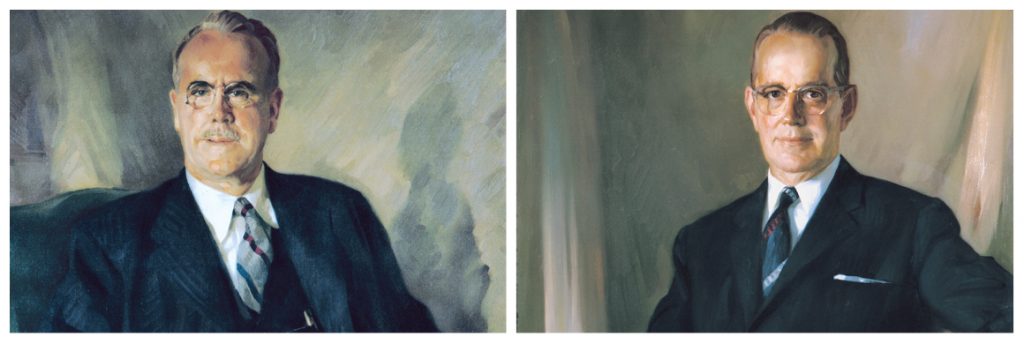
Legacy
Edwin Booz’s name is immortalized as the only name to remain with the firm from its humble beginnings through today. He believed that he could help companies prosper by bringing them “a human touch” and insisted that “people, not products” were the focus of work. This approach gave birth to the modern management consulting profession.
Meanwhile, Jim Allen’s legacy lives on at the Kellogg School of Business at the James L. Allen Center. According to Kellogg, the Center hosts more than 6000 executives each year for one or more of the school’s 160 executive education programs. Considered “an academic retreat,” the Allen Centers offers living and learning spaces to the Kellogg community. Technologically enabled classrooms and comfortable gathering and group study spaces facilitate peer learning and informal interactions among faculty and participants. Additional amenities include indoor workout areas and outdoor exercise programs along the Lake Michigan shoreline provide opportunities for the occasional (and necessary) break and breather.
Your Future A.T. Kearney Career is Waiting for You
For many organizations, finding a candidate with an MBA degree on their resume is a shortcut to knowing how well they will succeed at the company. With the strong foundational business skills the degree provides, companies can feel safe hiring an MBA student or graduate.
Founded in the mid 1920s, A.T. Kearney is a Chicago-based global management consulting firm and on of the more active MBA recruiters. As of 2016, the company holds 60 offices in over 40 countries throughout the globe, with roughly 3,500 employees.
Why Work at A.T. Kearney?
A.T. Kearney has made a commitment to creating transformational experiences for its clients, it makes the same promise for its employees. The company strongly believes that diversity is a key part of its culture, and aims to create an inclusive environment where people of any background can find success. The firm is unique in its offering of personalized programs that can help each employee find the perfect path to career success. Programs like Success with Flex, which offers flexible scheduling options, Pathway for Parents, which provides resources for working caregivers, or the Encore program, which helps professionals reenter the workforce after a long break, demonstrate the company’s commitment to creating a positive work environment for all its employees.
On Glassdoor, anonymous current and former A.T. Kearney employees largely praise the consulting company, giving it an overall positive rating of 4.2. In context, that’s just outside of the “2018 Best Places to Work” top 100 ranking, making it one of the more attractive destinations for current and future MBA grads. Employees cite flexible scheduling and good health insurance policies among the myriad of benefits, but at the end of the day, the pay is what stands out.
According to Glassdoor data, compiled by CNBC, A.T. Kearney employees earn the highest median salary of any employer in the entire United States, with a median total base compensation of $175,000. And with some positively alluring bonuses, that puts employees in the $200,000 range.

How To Get Your Foot in the Door
A.T. Kearney recruits talent in a number of ways. The company already works alongside a number of top business schools in the country, offering networking events, career fairs, and presentations on campus. Students can also begin the interviewing process right on campus. Even if the company does not offer programs at a particular campus, students can still apply directly through the website.
Another important way interested MBAs can get their foot in the door is through the Summer Consultant Program; a ten-week internship which teaches students about what its like to be a consultant at A.T. Kearney. The program starts with a three-day training program at a central location, helping interns to understand the company’s culture and specific approaches to consulting. After the three-day program, interns will return to their local offices and begin working on project assignments. At A.T. Kearney, Summer Consultants are treated the same as any other full-time associate and must collaborate with managers, principles and partners to create client solutions.
“The Summer Consultant Program allowed me to make an impact through my client work, get a real feel for the office’s culture, and, most importantly, build strong relationships with future colleagues at all levels of the firm. In all, the experience left me excited about the opportunity to join the firm full-time,” says Kate Maheu, a full-time associate who started as a Summer Consultant in 2013.
What Types of Jobs are Available?
From summer consultants and beyond, A.T. Kearney has a number of jobs for which they are seeking talented MBA graduates. Below are just a couple examples of positions open at the time of writing.
Associate – Digital Transformation:
The first of its kind among management firms, the Digital Transformation practice at A.T. Kearney offers organizations help in making sense of their changing needs in an constantly evolving business world. The Digital Transformation Associate works alongside clients, collaborating and problem-solving in a fast paced environment with the potential to make a big impact. The perfect consultant for this role would possess an MBA from a leading institution and have 5-10 years of success in Business and Technology.
The Contracts Officer at A.T. Kearney will be a senior member of the Public Sector team at the company, responsible for management of contracts between the firm and Government agencies. The ideal candidate for this position would hold have active business connections in government sectors and more than ten years experience in a consulting environment. An undergraduate degree is required for this role with an MBA highly preferred.
Georgetown McDonough MBA Career Center Releases 2017 Employment Stats
No surprise: Georgetown MBAs are making bank!
According to the most recent employment report from the Georgetown University McDonough School of Business, the average starting salary for graduates was $112,501, which is a 4 percent increase from the previous year.
“Every year, we deepen our commitment to applying a personalized approach to our students’ job searches, and every year, the results exceed our expectations,” Doreen Amorosa, associate dean and managing director of the MBA Career Center, said. “From the expanded and customized approaches to the job search in the MBA Career Center to curricular offerings like our Executive Challenge, our MBA students are prepared to excel in their careers.”
Additionally, the report stated that the average signing bonus of recent McDonough graduates were $28,516, a 13 percent increase from last year. Job offers accepted within three months of graduation also rose from 90 to 92 percent.
The report provide some addition, equally interesting information. For example, the top four industries of choice for Georgetown McDonough MBAs are financial services (33 percent), consulting (28 percent), technology (13 percent), and non-profit/social impact sector (7 percent).
MBA graduates in the consulting industry are the highest earners among recent McDonough alums, pulling in over $124,000 annually, followed closely by those employed in the healthcare industry, which earned nearly $121,000 per year. In all, McDonough MBA grads included in the report earned lucrative positions at well-known companies, like Amazon, Bank of America, Barclays, Citi Group, Credit Suisse, Deloitte, EY, Google, PwC, and Verizon.
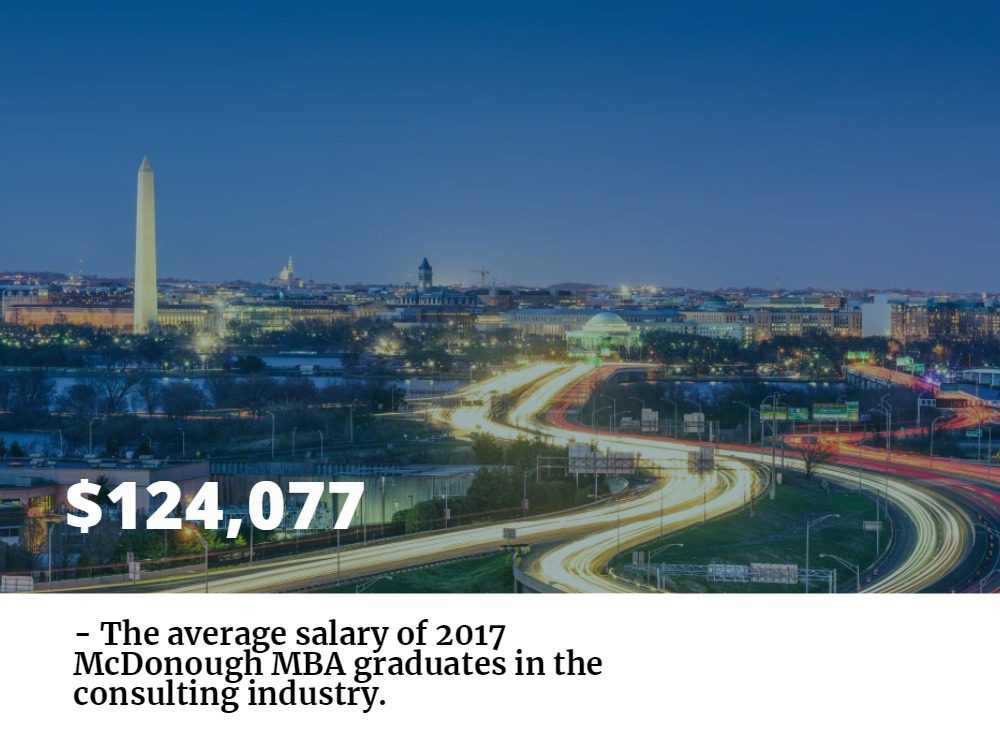
As far as internship data goes, 99 percent of first-year students secured an internship, with 85 percent of those paid positions. The average monthly compensation for internships was $6,501. Perhaps most impressive was that 81 percent of these internships were facilitated by the MBA Career Center, which is up 13 percent from 2016.
The Georgetown McDonough MBA Career Center is home to student organizations, Career Days and Treks, and on and off-campus networking events. The center partners with McDonough School of Business alumni to connect the future business leaders of America with today’s movers and shakers.
“We have invested in numerous strategic initiatives in recent years, including customizable search technologies, alumni mentoring tools, and offerings designed to individualize each student’s career outcomes,” Amorosa added in the press release. “Those, combined with our staff of certified career coaches and career curriculum that begins the summer before students arrive on campus, we equip our students with the strategies and experiences to be successful in their search.”
For a Career in Supply Chain Management, Head to Washington DC
Today’s boardroom is tomorrow’s chopping block. Business is a beast, no doubt, one whose needs grow increasingly demanding and complex along with those of we, the consumers, who drive it.
To navigate let alone thrive in this hectic environment requires unprecedented strategy, analysis, and execution. For many companies navigating the unruly seas, so to speak, the great white hope is an unsung hero of sorts: the supply chain manager.
Supply chain managers, or SCMS, have long been vital to the quality and productivity of projects. In short: SCMs oversee how all the constituent parts of their product—raw materials, information, and finance—move from supplier to manufacturer to wholesaler to retailer to consumer.
There are certainly lots of moving parts to this position—no pun intended—which makes sense why supply chain management has become such a popular concentration at business schools and an increasingly in-demand gig for graduates.
When it comes to ideal places to pursue an SCM degree, it doesn’t get any better than Washington DC, a cosmopolitan, cross-sectional hub for politics, business, and tech. In addition to its strategic mid-Atlantic location, sandwiched between the business centers of the lower Midwest, the upper Southeast, and the lower Northeast, the Chocolate City is home to a wide range of industry players, offering infinite access to whichever field you aspire to enter through an SCM degree. In addition to the warm, friendly folks like Lockheed Martin and Capital One that make their home in the Beltway, startups like HireKeep, NotionTheory, and Click2Mail do as well.
For you aspiring supply chain managers out there, we did the legwork for you and took a deeper dive into four DC metro degrees.
University of Maryland’s R.H. Smith School of Business
The UMD Smith MS in Supply Chain Management is consistently ranked as one of the most innovative in the region. Whether you’re looking to become a buyer, a logistics officer, freight specialist, or key account specialist, Smith will give you the “relevant, real-world experience” needed to “drive business growth, promote efficiency, sustain the planet,” and last but not least—impress recruiters. Smith’s deep ties to Wal-Mart, Bosch Rexroth, AstraZeneca, China Mobile Cooperation, and Unilever will surely benefit Smith MBAs. All graduates become Lean Six Sigma Yellow Belt™ (ICYB™) Certified by the International Association for Six Sigma Certification (IASCC).
Howard University School of Business
The Howard University School of Business‘ Supply Chain Management (SCM) concentration was designed specifically to prepare students for “leadership roles in global corporations and government entities.” Howard’s combination of faculty, curriculum, executive sponsorship, and real world experience means that graduates are well-equipped to meet the demands of an increasingly competitive job market.
CHECK THIS OUT: What Are The Differences Between The World’s Best Online MBA Programs?
Georgetown’s McDonough School of Business
Operations and Information Management (OPIM) concentration at Georgetown University’s McDonough School of Business is an interdisciplinary effort that combines Production and Operations Management, Operations Research/Management Science, Statistics/Decision Analysis, and IT/Systems Management. OPIM was designed to create opportunities for research and employment within information systems that support decision processes, risk management, business analytics, and global operations.
George Mason University School of Business
The George Mason University School of Business offers a Project Management concentration that might appeal to MBA candidates with an interest in supply chain. The Project Management concentration—available both online and on-campus—was designed to give MBA candidates the “knowledge and skills needed to manage major projects from conception to implementation.”
Stevens Lecture Encourages Employees to Take Life and Career Into Their Own Hands
When it comes to relationships between employees and their employers, a lacking connection often means workers must do more for their own future, says Fran Dramis, who recently spoke at the Stevens Institute of Technology’s School of Business.
Dramis, a former leader at financial institutions like Salomon Brothers, CitiBank, BellSouth, and Coopers & Lybrand, explained that the lack of a meaningful social contract between corporations and employees means that workers must be strategic about their own job security.
“How do you make it so unintended consequences become intended? When the downsizing happens, the people who get eliminated are the support people, not the strategic people. Your job as a leader is to make your organization and your employees strategic. Don’t go to work someplace that doesn’t offer you that, or you’ll be the first to be laid off,” he explains.
As the CIO at BellSouth, Dramis retention strategy was to give employees “life security,” as opposed to job security. “You have to increase their marketability, help them learn new skills. If you give someone life security, they’ll stay with you.”
Stevens Professor and information systems expert Michael Parfett worked under Dramis in a few different positions over the years. In his introduction, Parfett praised Dramis’ “life security” approach. “He kept asking me if I was updating my résumé. No other boss has ever asked me to do that. People do that when they’re getting ready to leave. In his book, it’s part of his technique — he gives you the ability to leave, but you don’t want to.”
Dramis concluded his talk with some words that he hoped might light a fire under future MBAs. “We’re rapidly moving to a digital society, where the interaction between business processes and digital enhancement is creating incredible opportunities. No company will hire you and tell you you’ll be there for the next 30 years. You have to take responsibility for your own life security.”
Defining Your Career Path With a Lehigh College of Business 1-MBA
Sponsored Content
Editor’s Note: As part of the Lehigh 1-MBA program enhancements, the internship component was replaced with a Consulting Practicum. Click here to learn more about the 1-MBA.
While crafty interview skills and a sharp résumé can greatly help the pursuit of a career, there’s no greater asset to future employment than a productive internship.
Two MBA students at the Lehigh University College of Business and Economics are learning the exceptionally valuable lessons of the intern experience, although the pathways to their current roles are certainly unalike. Richard London, a former law enforcement member from Lehigh Valley, Pennsylvania, and Suzanne Zar, a Central New Jersey native who spent the majority of her career in the healthcare industry, will both officially earn their MBA degrees before the end of 2017.
London was eligible to retire from law enforcement in 2015, but he wasn’t simply going to settle without a career moving forward. In a recent interview with MetroMBA, London revealed his ultimate decision to join the business school after viewing a 1-MBA presentation at a local community college.
“I immediately saw the advantages of obtaining an MBA for myself and I explored the differences between the Flex MBA and 1-MBA programs,” he says. “Given my age and my proximity to retirement, I determined the 1-MBA program was the best option for me.”
Zar, on the other hand, followed the more traditional MBA path. After earning a Bachelor’s degree in Sports Medicine/Human Physiology from the University of Delaware, Zar’s career has been centrally focused in global pharmaceuticals. However, Zar felt her career in the competitive industry could only go so far without an MBA.
“I had a long career in different facets of marketing and my clients were in the healthcare/pharmaceutical space,” she says. “I wanted to continue that work but as the decision maker working for a top pharma company ideally in oncology. To do so I needed to up my game! The level of positions I was looking at required an MBA and I wanted to keep a competitive advantage to ensure my success.”
The Lehigh 1-MBA program offered both London and Zar a direct chance to work in their desired fields. Zar earned a position with German chemical, pharmaceutical, and life sciences giant Bayer, which has its North American headquarters in Whippany, New Jersey. London’s role lead back to working side-by-side with law enforcement, through Montreal technology company Genetec Inc.
“Part of my responsibility before I retired from law enforcement was to manage the technology projects for the agency I worked for,” London notes. “ We have all seen the strained relationships between law enforcement and the public over the past few years. Part of the solution to easing that tension has been the development of technology products for law enforcement; particularly Body Worn Cameras (BWC) for officers.”
“I offered them [Genetec Inc.] some domain knowledge they did not have access to, and they offered me the opportunity to explore the law enforcement market to determine if my experiences were similar to other agencies across the country,” he continues. “I spent the summer traveling around the U.S. talking with law enforcement executives about their views and challenges with the new technology that is being thrust upon the industry and created a business and marketing strategy for the new group.”
Forging the directions in both London and Zar’s career trajectories relied both on an immeasurable internal work ethic and the significant hands-on approach Lehigh provides its students.
“What I would recommend about Lehigh is the personal connection students receive from the faculty and department heads,” Zar says. “The curriculum covers all of the bases in a traditional MBA as well as staying relevant with classes that tackle current business trends such as big data, technology and innovation.”
“It is the experience itself that has made this journey worth every minute,” London adds. “Real life is deadlines, commitments, relationships, time management; all things that can’t be learned in a classroom or by reading a book. From the moment you start the 1-MBA program, you are part of something; just like you would be in the real world; it’s like going to work for a small corporation. You are learning something new; but, you are learning it along side others in your cohort and you have to learn to rely on yourself, your classmates and the 1-MBA staff. If any part were missing, the experience would be different. For me, these are the real lessons from the 1-MBA program.
“The 1-MBA program stands apart from many of the programs out there by offering the highest level of education with professors that go above and beyond to help their students,” Zar concludes. “The size and diversity of the students in the program lends itself to great collaboration and experience sharing.”
For more information about the Lehigh University College of Business and Economics 1-MBA, visit the official school website here.
TCU Neeley Management Professor Michael Hitt Earns Career Achievement Award
A Distinguished Research Fellow at the Texas Christian University – Neeley School of Business, Michael Hitt, has received the Career Achievement/Distinguished Educator Award for his many contributions to the field of management throughout his career.
Hitt was presented with the award this year at the annual meeting for the Academy of Management. The award, one of the highest honors the Academy can give, was given in recognition of Hitt’s long career and service to the field of management through research, breakthrough developments, and innovative teaching methods.
“Letters of support from former students show Michael’s engagement and ongoing support for his students—encouraging everyone to be the best they could be, and going above and beyond to help them get there,” said one committee member who selected Hitt for the award.
Over his 40 years of teaching and research, Hitt has left his impact on the field of management in a number of ways. This is not the first time Hitt has been honored by the Academy of Management, however. He received the Irwin Outstanding Educator Award from the organization and being named as a “Thomas Reuters Highly Cited Researcher.” He has also served in different capacities for several scholarly journals, acting at one time as editor for the Academy of Management Journal, co-editor for the Strategic Entrepreneurship Journal, and with research published in a number of premier journals such as Organization Science, the Journal of International Business Studies, and many more.
Before coming to TCU, Hitt was a teacher at Texas A&M University, where he was the University Distinguished Professor Emeritus. He holds a BBA and MBA from Texas Tech University and a Ph.D. in organizational theory/behavior, quantitative methods in economics, and business policy from the University of Colorado.
Building a Career after Graduation: Columbia Business School
Huzzah! You made it through the b-school ringer! Now ready for the fun part? Finding a job!
Chicago Business Schools Prepare Students For Future Careers in Nonprofits
According to the Chicago Tribune, Windy City nonprofits reported a surge in spending and staffing in recent years. An annual survey by the CBRE Group, one of the world’s largest real estate companies, showed that 35 percent of Chicago-area nonprofits planned on expanding staff or office space, up from 24 percent reported in 2011. Additionally, 20 percent reportedly planned on increasing advocacy and marketing budgets, outpacing national averages. Continue reading…
Metro Jobs Report: Career Advice, Goldman Troubles and More
Let’s dig into the latest job news …
The Berkeley-Haas MBA Career Path
Three months after graduation, nearly 87 percent of University of California, Berkeley Haas School of Business full-time MBA students had a job. These graduates accepted positions in a variety of industries and at a range of top companies including Adobe, Cisco, Facebook and Microsoft. And thanks to Haas’ close connection with Silicon Valley, 38.8 percent were in technology. Continue reading…




